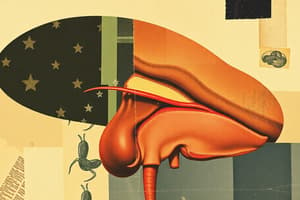Podcast
Questions and Answers
What does endocrinology study?
What does endocrinology study?
- Hormone secretion and its actions (correct)
- The structure of the brain
- The movement of the muscles
- The functioning of the kidneys
What is the result of a hormone's action?
What is the result of a hormone's action?
- Either positive or negative feedback (correct)
- Only positive feedback
- Only negative feedback
- No feedback at all
What is true about most endocrine disorders?
What is true about most endocrine disorders?
- They are all untreatable
- They are mostly treatable (correct)
- They are all inherited
- They are all life-threatening
What is a common symptom of hypothyroidism?
What is a common symptom of hypothyroidism?
What is the name of the medication used to treat hypothyroidism?
What is the name of the medication used to treat hypothyroidism?
What do endocrine glands do?
What do endocrine glands do?
What happens when a hormone takes action?
What happens when a hormone takes action?
What is true about hypothyroidism?
What is true about hypothyroidism?
What is the characteristic of catecholamine hormone?
What is the characteristic of catecholamine hormone?
What is the function of somatostatin and vasopressin?
What is the function of somatostatin and vasopressin?
What is the type of interaction between hormones?
What is the type of interaction between hormones?
What is the term for the regulation of hormone release?
What is the term for the regulation of hormone release?
What is the term for a hormone that inhibits the heart rate?
What is the term for a hormone that inhibits the heart rate?
What is the term for the excessive production of a hormone?
What is the term for the excessive production of a hormone?
What is the term for the failure of a hormone-secreting gland?
What is the term for the failure of a hormone-secreting gland?
What is the term for the investigation of hormone diseases?
What is the term for the investigation of hormone diseases?
What is the term for a hormone that stimulates lactation?
What is the term for a hormone that stimulates lactation?
What is the term for an incidental finding of a suprarenal mass?
What is the term for an incidental finding of a suprarenal mass?
Flashcards
Endocrinology
Endocrinology
The study of hormone release and their effects on the body.
Hormones
Hormones
Chemicals released by glands that travel via bloodstream to target cells to trigger a response.
Endocrine Glands
Endocrine Glands
Glands that secrete hormones internally, affecting distant cells or organs.
Humoral Hormone Release
Humoral Hormone Release
Signup and view all the flashcards
Neural Hormone Release
Neural Hormone Release
Signup and view all the flashcards
Synergistic Hormone Interaction
Synergistic Hormone Interaction
Signup and view all the flashcards
Permissive Hormone Interaction
Permissive Hormone Interaction
Signup and view all the flashcards
Antagonistic Hormone Interaction
Antagonistic Hormone Interaction
Signup and view all the flashcards
Endocrine Axis
Endocrine Axis
Signup and view all the flashcards
Hormone Excess
Hormone Excess
Signup and view all the flashcards
Hormone Deficiency
Hormone Deficiency
Signup and view all the flashcards
Hormone Hypersensitivity
Hormone Hypersensitivity
Signup and view all the flashcards
Hormone Resistance
Hormone Resistance
Signup and view all the flashcards
Dynamic Biochemical Tests
Dynamic Biochemical Tests
Signup and view all the flashcards
Incidentalomas
Incidentalomas
Signup and view all the flashcards
Biopsy
Biopsy
Signup and view all the flashcards
Study Notes
Introduction to Endocrinology
- Endocrinology is the study of hormone secretion and its effects on the body.
- Hormones are chemicals that are released by glands and travel through the bloodstream to reach their target cells, where they trigger a response.
- The response to hormone stimulation can be either positive (amplifying the effect) or negative (reducing the effect) feedback.
Endocrine Glands
- Endocrine glands produce hormones that are secreted internally and act on distant cells or organs.
- There are two types of glands: endocrine glands (e.g., thyroid, adrenal glands) and exocrine glands (e.g., salivary, sweat glands).
Major Classes of Hormones
- Amino acid derivatives: dopamine, catecholamine, thyroid hormone
- Small neuropeptides: GnRH, TRH, somatostatin, vasopressin
- Large proteins: insulin, LH, PTH
- Steroid hormones: cortisol, estrogen, testosterone
- Vitamins: vitamin A, vitamin D
Mechanisms of Hormone Release
- Humoral: hormones released into the bloodstream to reach their target cells
- Neural: hormones released by neurons to stimulate other neurons or cells
- Hormonal: hormones released by glands to stimulate their target cells
Functions of Hormones
- Regulation of metabolism, growth, and development
- Maintenance of homeostasis
- Response to stress
Interactions between Hormones
- Synergistic: multiple hormones working together to produce a combined effect
- Permissive: one hormone enhancing the effect of another hormone
- Antagonistic: one hormone reducing the effect of another hormone
Endocrine Axis
- The endocrine axis is a complex system of glands and hormones that regulate various physiological processes
- It involves a feedback loop, where hormones released by one gland stimulate or inhibit the release of hormones from another gland
Classification of Hormone Diseases
- Excess: overproduction of hormones by glands
- Deficiency: underproduction of hormones by glands
- Hormone hypersensitivity: abnormal response to normal hormone levels
- Hormone resistance: decreased response to normal hormone levels
Principles of Endocrine Investigations
- Timing of measurements: considering the natural rhythms of hormone release (e.g., circadian rhythm)
- Dynamic biochemical tests: stimulation or suppression tests to diagnose hormone deficiencies or excesses
- Imaging: using techniques like MRI to detect incidentalomas (unexpected tumors)
- Biopsy: examining tissue samples to determine whether a tumor is benign or malignant
Studying That Suits You
Use AI to generate personalized quizzes and flashcards to suit your learning preferences.




